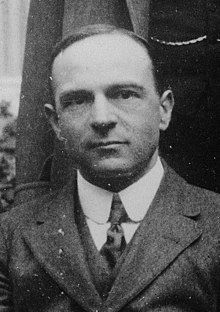Portal:Psychology
The Psychology Portal
| Part of a series on |
| Psychology |
|---|
Psychology is the scientific study of mind and behavior. Its subject matter includes the behavior of humans and nonhumans, both conscious and unconscious phenomena, and mental processes such as thoughts, feelings, and motives. Psychology is an academic discipline of immense scope, crossing the boundaries between the natural and social sciences. Biological psychologists seek an understanding of the emergent properties of brains, linking the discipline to neuroscience. As social scientists, psychologists aim to understand the behavior of individuals and groups.
A professional practitioner or researcher involved in the discipline is called a psychologist. Some psychologists can also be classified as behavioral or cognitive scientists. Some psychologists attempt to understand the role of mental functions in individual and social behavior. Others explore the physiological and neurobiological processes that underlie cognitive functions and behaviors.
Psychologists are involved in research on perception, cognition, attention, emotion, intelligence, subjective experiences, motivation, brain functioning, and personality. Psychologists' interests extend to interpersonal relationships, psychological resilience, family resilience, and other areas within social psychology. They also consider the unconscious mind. Research psychologists employ empirical methods to infer causal and correlational relationships between psychosocial variables. Some, but not all, clinical and counseling psychologists rely on symbolic interpretation. (Full article...)
Selected article -
The Lafargue Mental Health Clinic, more commonly known as the Lafargue Clinic, was a mental health clinic that operated in Harlem, Manhattan, New York, from 1946 until 1958. The clinic was named for French Marxist physician Paul Lafargue and conceived by German-American psychiatrist Fredric Wertham, who recognized the dire state of mental health services for blacks in New York. With the backing of black intellectuals Richard Wright and Ralph Ellison, as well as members of the church and community, the clinic operated out of the parish house basement of St. Philip's Episcopal Church and was among the first to provide low-cost psychiatric health services to the poor, especially for poor blacks who either could not afford treatment at New York hospitals or faced racial discrimination from doctors and other hospital staff. The staff consisted entirely of volunteers, and Wertham and Hilde Mosse were the clinic's lead doctors.
Though the clinic only operated for 12 years, Wertham and Mosse's experiences from Lafargue were cited in a court decision to integrate schools in Wilmington, Delaware, and later in Brown v. Board of Education, which ruled that separate black and white schools were unconstitutional. Wertham would use case studies from his time at the clinic to support his later arguments that comic books caused juvenile delinquency, as evidenced in his 1954 work Seduction of the Innocent. (Full article...)
Selected image -

Quotes -
- "Not a single one of the cells that compose you knows who you are, or even cares." — Daniel Dennett
WikiProjects
Selected biography -

Alfred Ernest Jones FRCP MRCS (1 January 1879 – 11 February 1958) was a Welsh neurologist and psychoanalyst. A lifelong friend and colleague of Sigmund Freud from their first meeting in 1908, he became his official biographer. Jones was the first English-speaking practitioner of psychoanalysis and became its leading exponent in the English-speaking world. As President of both the International Psychoanalytical Association and the British Psycho-Analytical Society in the 1920s and 1930s, Jones exercised a formative influence in the establishment of their organisations, institutions and publications. (Full article...)
Did you know (auto-generated) -

- ... that fashion psychology is an interdisciplinary field that studies the interaction between human behavior, psychology, and fashion?
- ... that Cara De Silva described a cookbook compiled by a woman in Terezin concentration camp as a record of "psychological resistance”?
- ... that diverse fields study the mind, including psychology, neuroscience, cognitive science, and philosophy?
- ... that Angéline de Montbrun by Laure Conan is the first psychological novel written by a French Canadian?
- ... that the psychological inner space genre was a rebellion against the traditional focus of science fiction on literal outer space?
- ... that food psychology research has found that the COVID-19 pandemic led to both reduced and increased consumption of junk food among different geographical populations and educational backgrounds?
Subcategories
Related portals
More did you know -
- ...that Julian Rotter developed the locus of control theory, which has been widely used in the psychology of personality?
- ...that the effects of head trauma on memory can be seen by the post-operative results of HM, a patient who has been unable to form any new long-term memories since a surgical procedure performed in the 1950s?
Psychology topics
Recognized content
Associated Wikimedia
The following Wikimedia Foundation sister projects provide more on this subject:
-
Commons
Free media repository -
Wikibooks
Free textbooks and manuals -
Wikidata
Free knowledge base -
Wikinews
Free-content news -
Wikiquote
Collection of quotations -
Wikisource
Free-content library -
Wikiversity
Free learning tools -
Wiktionary
Dictionary and thesaurus























